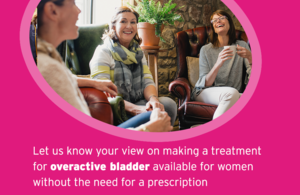Share your views on making a treatment for overactive bladder available for women without need for prescription
The Medicines and Healthcare products Regulatory Agency is calling for women who experience symptoms associated with overactive bladder such as the urgent need to urinate to make their views heard as part of a consultation launched today.

Let us know your views on making a treatment for overactive bladder available for women without the need for prescription.
This would be the first time a medicine for the treatment of overactive bladder would be available without prescription.
Pharmacists, GPs and other health care professionals, the public and women are encouraged to take part in the reclassification consultation.
Aquiette 2.5mg Tablets contains oxybutynin hydrochloride and are being considered for reclassification. These tablets are used to treat women with milder symptoms of overactive bladder that are not controlled by bladder training alone. Symptoms of this include having to urinate at least 8 times in the day, more than once during the night, sometimes leading to accidental leaks.
If positive responses are received and the decision is made to reclassify this treatment, then pharmacists will have access to training materials and a checklist to enable them to identify women who can be supplied this medicine safely.
Dr Laura Squire, Chief Healthcare Quality and Access Officer at the MHRA, said:
“We encourage women and healthcare professionals who have experience of using this vital treatment to engage with the consultation and make your views heard. Every response we receive will help us gain a better picture of whether people think this reclassification would be beneficial.
“Living with an overactive bladder can be extremely difficult, which is why it’s so important that we hear from as many people and women’s groups as possible.
“We are thoroughly committed to improving access to medicines where it is safe to do so”
Minister for Women’s Health Maria Caulfield said:
“When it comes to sensitive issues such as bladder control, speaking to a GP may act as a barrier for some women to seek help. Reclassification of Aquiette would enable women to access vital medication without needing a prescription.
“Making it easier for women to access healthcare is essential in supporting them to live well and reducing the gender health gap.
“I encourage any women who have experienced these symptoms to make your voices heard by responding to the call for evidence.”
The Commission on Human Medicines (CHM) has been consulted and advised that it is safe for these is products to be made available as a Pharmacy (P) medicine.
Find further details about the consultation, including how to take part here.
Notes to Editor
- Consultation page
- Medicines and Healthcare products Regulatory Agency (MHRA) is responsible for regulating all medicines and medical devices in the UK by ensuring they work and are acceptably safe. All our work is underpinned by robust and fact-based judgements to ensure that the benefits justify any risks.
- MHRA is an executive agency of the Department of Health and Social Care.
- The Commission on Human Medicines (CHM) advises ministers on the safety, efficacy and quality of medicinal products.